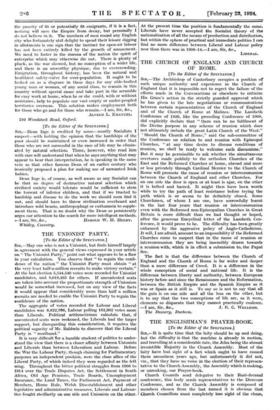THE UNIONIST PARTY.
[To the Editor of the SPECTATOR.] SIR, May one who is not a Unionist, but finds himself largely in agreement with the general views expressed in your article on " The Unionist Party," point out what appears to be a flaw in your calculation. You observe that " to regain the confi- dence of the nation " the Unionist Party must obtain " at the very least half-a-million recruits to make victory certain."
• At the last election 5,544,540 votes were recorded for Unionist
candidates, and 9,019,495 for others. If uncontested seats are taken into account the proportionate strength of Unionism would be somewhat increased, but on any view of the facts it would appear that considerably more than half a million recruits are needed to enable the Unionist Party to regain the confidence of the nation.
The aggregate of votes recorded for Labour and Liberal candidates was 8,822,706, Labour polling 182,302 votes more than Liberals. Political arithmeticians calculate that, if uncontested seats were reckoned, the Liberals had the larger support, but disregarding this consideration, it requires the political sagacity of Mr. Baldwin to discover that the Liberal Party is " moribund."
It is very difficult Tor a humble student of politics to under- stand the view that there is a closer affinity between Unionists and Liberals than between Liberalism and Labour. Before the War the Labour Party, though claiming for Parliamentary purposes an independent position, were the close allies of the Liberal Party, of which indeed they were regarded as the left wing. Throughout the bitter political struggles from 1906 to 1914 over the Trade Disputes Act, the Settlement in South Africa, Old Age Pensions, Trade Boards, Unemployment Insurance, the Land Taxes, the Parliament Act, Payment of Members, Home Rule, Welsh Disestablishment and other legislative and administrative measures, Liberals and Labour- ites fought stedfastly on one side and Unionists on the other. At the present time the position is fundamentally the same. Liberals have never accepted the Socialist theory of the nationalization of all the means of production and distribution, but within the sphere of practical and immediate politics I can find no more difference between Liberal and Labour policy now than there was in 1906-14.—I am, Sir, &c.,
LmnaAL.










































 Previous page
Previous page